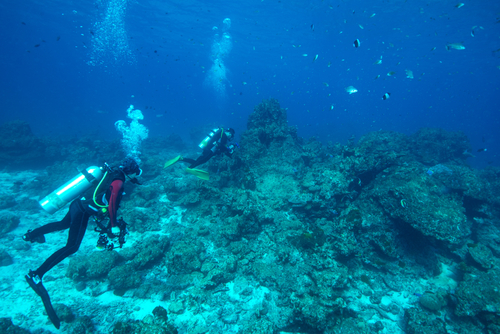
Are You Considering Studying Oceanography? Check out this Career Close-Up on Jacques Cousteau
“The future is in the hands of those who explore… and from all the beauty they discover while crossing perpetually receding frontiers, they develop for nature and for humankind an infinite love.”
–Oceanographer Jacques Cousteau
 If this quote resonates with you, you may want to pursue a career spending time in, exploring, researching, documenting, and/or protecting the natural environment. If the ocean calls to you in particular, becoming an oceanographer could be a very fulfilling career option. The ocean covers the majority of our planet’s surface and its depths and ecosystems offer many fascinations and mysteries. As Seasky.org puts it, “from the times of the first boats and the diving bell, to modern sonar and satellite observation, ocean exploration has a long and fascinating history.” A key figure in the fascinating history of oceanography is Jacques Cousteau.
If this quote resonates with you, you may want to pursue a career spending time in, exploring, researching, documenting, and/or protecting the natural environment. If the ocean calls to you in particular, becoming an oceanographer could be a very fulfilling career option. The ocean covers the majority of our planet’s surface and its depths and ecosystems offer many fascinations and mysteries. As Seasky.org puts it, “from the times of the first boats and the diving bell, to modern sonar and satellite observation, ocean exploration has a long and fascinating history.” A key figure in the fascinating history of oceanography is Jacques Cousteau.
Cousteau’s Life and Work
Jacques Cousteau was born in Gironde, France in 1910. He learned to swim when he was only four years old. Biography.com shares that while he was not particularly successful in his adolescent academic studies, “he showed a strong curiosity for mechanical objects and upon purchasing a movie camera, he took it apart to understand how it operated.” He attended the Collège Stanislas in Paris and joined the French Navy in 1930, where he would learn to fly and become a member of the navy’s information services. This work and his interest in photography led him to create films of the Indian and Pacific Oceans. Also in the 1930’s, he swam often as recuperation for injuries from a serious car accident and began to explore the Mediterranean Sea wearing goggles. He married in 1937 and fathered two sons who would later join him in his voyages. He began to experiment with underwater research and created a film called “Par dix-huit mètres de fond,” or, “18 Meters Deep” with a neighbor who shared his interests. This film won the Ex-Aequo Prize from the Congress of Documentary Film. Cousteau invented the incredible aqua lung with the engineer Emile Gagnan, which allowed divers to stay underwater for long periods for the first time. He also invented an underwater camera that could withstand the ocean’s deep water pressure. These collaborations and developments became the foundation for his career as an oceanographer and environmental filmmaker.
In WWII, Cousteau joined the French Resistance and after the war, he helped the navy to remove underwater mines. He received medals for his heroism in the war. In 1948, he participated in what is now known as the first underwater archaeology expedition to the wreck of the Roman ship called Mahdia with other divers and scientists. In 1950, he founded a French Oceanographic Campaign and soon after published his now famous book about exploring the ocean: The Silent World. By the end of his career, Cousteau would write and create over 50 books and over 100 TV documentaries about the ocean. He is known for using popular media to draw attention to the mysteries of the ocean and the importance of its conservation. He is most well-known for the series, “The Undersea World of Jacques Cousteau,” which launched in 1968 and ran for nine seasons. As he aged, his work became increasingly more environmentally themed. In 1973 he founded the Cousteau Society with this focus in mind. Cousteau’s last film in 1989 covered the Exxon Valdez oil spill. He died in 1997.
Becoming an Oceanographer
While, clearly, there are many ways to delve into the study of the ocean and join the ranks of ocean explorers, becoming an oceanographer does require coursework in the sciences. Environmental Science.org explains that biology, physics, chemistry, and geology are typical undergraduate studies for future oceanographers, while some schools do offer bachelor’s degree in oceanography. It is common for students studying the ocean to also work as interns or assistants to gain additional scientific field experience. Masters degrees, PhDs, and specialized studies come next for those who desire to take their oceanography work to higher and deeper levels. Environmental Science.org also states that, “oceanographers study every different aspect of the ocean, such as the chemistry of the of ocean water, the geology associated with the ocean, the physical movements of the ocean water, or even the life that calls the ocean its home.”
If you choose the path of an oceanographer, you may become specialized as a marine biologist, physical oceanographer, chemical oceanographer, or geological oceanographer. Or, your scientific career may take you in another direction of study and exploration. I hope whatever course you chart is full of wonder and fulfillment.
Written by Julia Travers
Contact us today to learn more about how our tutors can help your child this fall!



